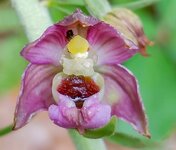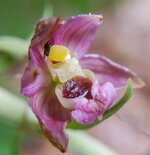I know these aren't the best macro shots, but I wanted to share the unusual beauty and method of this flower.
This tiny Orchid variety is very unusual in how it attempts successful pollination. The nectar looks similar to jelly with sweet compounds, attracting smell, and "narcotics". I took these photos a couple of years ago and had only one days' chance at it. The fruit fly or wasp inside there hung around quite awhile and acted quite confused and wobbly. It wasn't until I researched the plant that I discovered the toxic nature of the nectar. Although it is considered an "invasive" species, I only had the one plant at the edge of the woods. The next day I was ready with tripod etc. for some better shots and....{{sigh}}... the plant was gone, probably a deer or Turkey got to it. I have not found anymore since then, and I search regularly through the growing months.
Here's a clip from a site that explains it a bit:
"This orchid actively gets its pollinators wasted, but how?
Along with the chemicals we already touched on, scientists have also found a plethora of narcotics in broad-leaved helleborine nectar. These include various types of alcohols and even chemicals similar to that of opioids like Oxycodone. Now, some have argued that the alcohols are not the product of the plant but rather the result of fermentation by yeasts and bacteria living within the nectar. However, the presence of different antimicrobial compounds coupled with the sheer concentrations of alcohols within the nectar appear to discount this hypothesis and point to the plant as the sole creator. Nonetheless, after a few sips of this narcotic concoction, insects like wasps and flies spend a lot more time at each flower than they would if they remained sober the whole time. This has led to the suggestion that narcotics help improve the likelihood of successful pollination."
Nikon D7100, 50mm + 20mm ext. tube, daylight, ISO 400, F/5.6, handheld.
This tiny Orchid variety is very unusual in how it attempts successful pollination. The nectar looks similar to jelly with sweet compounds, attracting smell, and "narcotics". I took these photos a couple of years ago and had only one days' chance at it. The fruit fly or wasp inside there hung around quite awhile and acted quite confused and wobbly. It wasn't until I researched the plant that I discovered the toxic nature of the nectar. Although it is considered an "invasive" species, I only had the one plant at the edge of the woods. The next day I was ready with tripod etc. for some better shots and....{{sigh}}... the plant was gone, probably a deer or Turkey got to it. I have not found anymore since then, and I search regularly through the growing months.
Here's a clip from a site that explains it a bit:
"This orchid actively gets its pollinators wasted, but how?
Along with the chemicals we already touched on, scientists have also found a plethora of narcotics in broad-leaved helleborine nectar. These include various types of alcohols and even chemicals similar to that of opioids like Oxycodone. Now, some have argued that the alcohols are not the product of the plant but rather the result of fermentation by yeasts and bacteria living within the nectar. However, the presence of different antimicrobial compounds coupled with the sheer concentrations of alcohols within the nectar appear to discount this hypothesis and point to the plant as the sole creator. Nonetheless, after a few sips of this narcotic concoction, insects like wasps and flies spend a lot more time at each flower than they would if they remained sober the whole time. This has led to the suggestion that narcotics help improve the likelihood of successful pollination."
Nikon D7100, 50mm + 20mm ext. tube, daylight, ISO 400, F/5.6, handheld.


